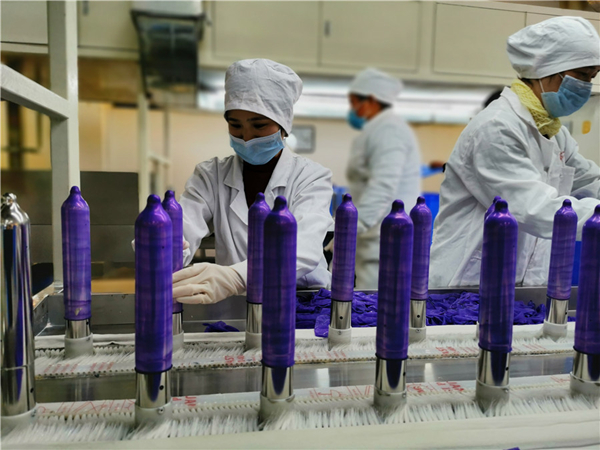Guilin HBM Health Protection Ltd

Employees at Guilin HBM Health Protection Ltd use electronic leak meter to test the newly produced condoms.[Provided to China Daily]
According to data from the Joint United Nations Programme on HIV and AIDS or UNAIDS, 7.7 million people in South Africa were living with HIV, while HIV prevalence-the percentage of people living with HIV-among adults (aged 15 to 49) was 20.4 percent.
UNAIDS said there has been significant reduction in the number of AIDS-related deaths in South Africa since 2010. In fact, the almost 50-percent decrease to 71,000 deaths can be attributed to a certain extent to the growing use of condoms.
For the health of people, Nelavani Ranchhod, a manager of Latex, traveled three times to China to study the condom industry.
In 2015, when she first came into contact with Guilin HBM, Ranchhod was deeply impressed by the Chinese company's highly efficient modern condom production facilities. "It is a very good timing for companies in both countries to jointly build a production base that has never existed in South Africa," she said.
At that time, the African country's enhanced efforts to construct its own industrial system also facilitated the partnership between the two companies.
Hu from Guilin HBM said: "Our company exported advanced, fullyautomated production lines to this project in South Africa. We sent excellent technicians to install the equipment, and assigned outstanding executives to offer free training to middle-level managers of the South African factory."
In 2017, the South Africa-based condom factory, using the same production standards as those of Guilin HBM, began operations successfully. Later that year, it delivered the first batch of high-quality condoms to the government for distribution to people in need.
Thanks to the joint efforts, consumers in South Africa can finally have world-class condoms made domestically. "None of this could have been possible without the support of Chinese companies," Thembinkosi said.
The first-phase construction of Latex cost $5 million, and its annual output of condoms exceeded 300 million pieces. But the capacity is not yet enough.
In August 2019, a delegation of Latex paid another visit to Guilin, seeking support from Chinese companies for the second-phase construction and higher-level cooperation. Both sides discussed the feasibility of introducing more products with cutting-edge technology to South Africa.
Hu said Guilin HBM will accelerate the feasibility study on exporting the products to South Africa and then the entire African market.


